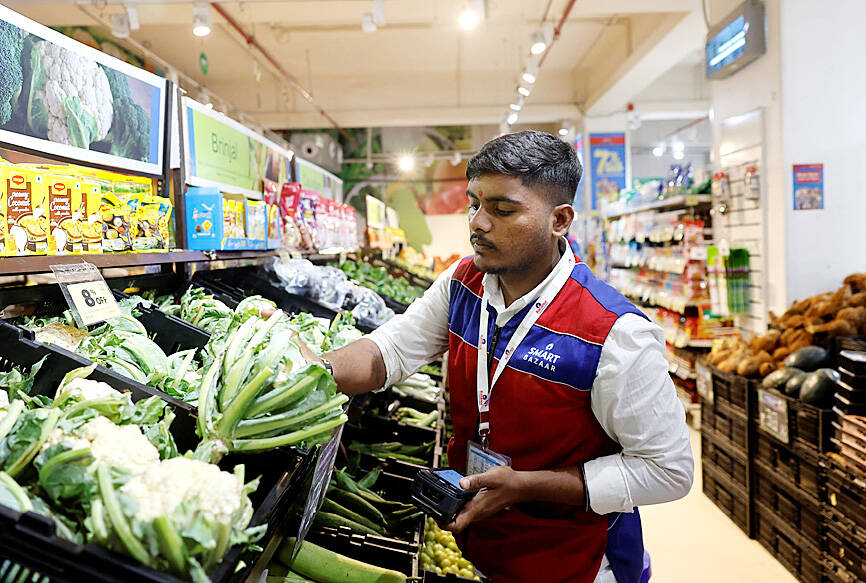India has offered tariff cuts on imports of US farm products, such as almonds and cranberries, as a further concession to Washington, hoping to avert US President Donald Trump’s reciprocal tariffs set for next week, two government sources said.
Unlike China, Canada and the EU, India is actively seeking to appease the Trump administration and is open to cutting tariffs on more than half of US imports worth US$23 billion, Reuters reported earlier this week.
In a series of meetings in New Delhi with US Assistant Trade Representative for South and Central Asia Brendan Lynch, India agreed to cut tariffs on bourbon whiskey and agricultural products such as almonds, walnuts, cranberries, pistachios and lentils, one of the sources familiar with discussions said.

Photo: Reuters
The talks to fast-track negotiations were likely to have concluded late yesterday.
Trade talks are “progressing well” and the bilateral trade pact, still in progress, would benefit the two nations, Indian Minister of Commerce and Industry Piyush Goyal said on Thursday.
“Securing a favorable deal is a priority for Indian negotiators,” a second government source said, adding that India has aligned its offers with US priorities, particularly in the agriculture industry and some other sectors.
Both sources spoke on condition of anonymity due to the sensitivity of the talks.
The Indian Ministry of Commerce and Industry did not respond to an e-mail request for a comment, while the US embassy spokesperson in New Delhi said: “We don’t have anything to share on private diplomatic discussions.”
India lowered duties for bourbon whiskey to 100 percent from 150 percent last month. Import duties range from 30 percent to 100 percent on agricultural products such as cranberries, almonds, walnuts, and about 10 percent on lentils.
However, there is still resistance in government circles to lowering tariffs for dairy products, rice, wheat and maize, the source said, adding that India is seeking greater market access for shipments of fruits such as pomegranates and grapes besides rice to the US market.
The negotiators are expected to agree on the framework for the broad contours of the first phase of the bilateral deal, which is expected to be signed by fall, the sources said.
Last year, exports of US agriculture and allied products to India totaled nearly US$2 billion, including US$452 million in alcoholic beverages and US$1.3 billion in fruits and vegetables.
India’s exports to the US stood at about US$5.5 billion during the same period.

WEAKER ACTIVITY: The sharpest deterioration was seen in the electronics and optical components sector, with the production index falling 13.2 points to 44.5 Taiwan’s manufacturing sector last month contracted for a second consecutive month, with the purchasing managers’ index (PMI) slipping to 48, reflecting ongoing caution over trade uncertainties, the Chung-Hua Institution for Economic Research (CIER, 中華經濟研究院) said yesterday. The decline reflects growing caution among companies amid uncertainty surrounding US tariffs, semiconductor duties and automotive import levies, and it is also likely linked to fading front-loading activity, CIER president Lien Hsien-ming (連賢明) said. “Some clients have started shifting orders to Southeast Asian countries where tariff regimes are already clear,” Lien told a news conference. Firms across the supply chain are also lowering stock levels to mitigate

IN THE AIR: While most companies said they were committed to North American operations, some added that production and costs would depend on the outcome of a US trade probe Leading local contract electronics makers Wistron Corp (緯創), Quanta Computer Inc (廣達), Inventec Corp (英業達) and Compal Electronics Inc (仁寶) are to maintain their North American expansion plans, despite Washington’s 20 percent tariff on Taiwanese goods. Wistron said it has long maintained a presence in the US, while distributing production across Taiwan, North America, Southeast Asia and Europe. The company is in talks with customers to align capacity with their site preferences, a company official told the Taipei Times by telephone on Friday. The company is still in talks with clients over who would bear the tariff costs, with the outcome pending further

Six Taiwanese companies, including contract chipmaker Taiwan Semiconductor Manufacturing Co (TSMC, 台積電), made the 2025 Fortune Global 500 list of the world’s largest firms by revenue. In a report published by New York-based Fortune magazine on Tuesday, Hon Hai Precision Industry Co (鴻海精密), also known as Foxconn Technology Group (富士康科技集團), ranked highest among Taiwanese firms, placing 28th with revenue of US$213.69 billion. Up 60 spots from last year, TSMC rose to No. 126 with US$90.16 billion in revenue, followed by Quanta Computer Inc (廣達) at 348th, Pegatron Corp (和碩) at 461st, CPC Corp, Taiwan (台灣中油) at 494th and Wistron Corp (緯創) at

NEGOTIATIONS: Semiconductors play an outsized role in Taiwan’s industrial and economic development and are a major driver of the Taiwan-US trade imbalance With US President Donald Trump threatening to impose tariffs on semiconductors, Taiwan is expected to face a significant challenge, as information and communications technology (ICT) products account for more than 70 percent of its exports to the US, Chung-Hua Institution for Economic Research (CIER, 中華經濟研究院) president Lien Hsien-ming (連賢明) said on Friday. Compared with other countries, semiconductors play a disproportionately large role in Taiwan’s industrial and economic development, Lien said. As the sixth-largest contributor to the US trade deficit, Taiwan recorded a US$73.9 billion trade surplus with the US last year — up from US$47.8 billion in 2023 — driven by strong